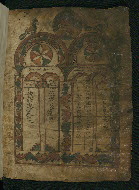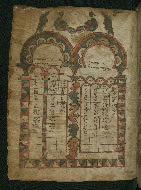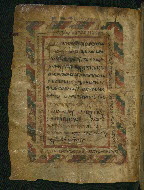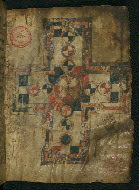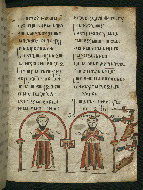Home > Digitized Walters Manuscripts
This document is a tranformation of a TEI P5 XML manuscript description incorporating images. If you have trouble reading special or non-Latin characters on this page, please make sure you have appropriate Unicode fonts installed and an up-to-date web browser.
Walters Ms. W.537, Gospels
Browse images (Browse images in a new window) | TEI in XML format
W.537
Gospels
Vernacular: աւետարան
Dated to the tenth century, this manuscript is the oldest Armenian codex in North America and the fifth oldest among documented Armenian Gospel Books. The principal colophon on fol. 2v records that Sargis the Priest completed the text in 415 [966 CE]. Within the framed area, the commission of the codex is described: a priest, whose name was replaced by the later owner T’oros, commissioned the work "as decoration and for the splendor of [the] holy church and for the pleasure of the congregation of Rznēr." As the codex was written and commissioned by priests, the manuscript is referred to as the “Gospels of the Priest.” It was formerly known as the “Gospels of the Translators,” as, following the date 415, someone erased the formula “of the Armenian era” and replaced it with “of our Lord,” suggesting an earlier date and implying that the text was based on the original translation of the Gospels into Armenian during the fifth century. The text is copied in large angular erkat‘agir script. The full-page paintings and marginal ornaments bear stylistic characteristics of Armenian illumination of the tenth and eleventh centuries associated with non-royal patronage. The illustrations comprise the Canon Tables, with only the last two remaining; the Virgin and Child on a wheeled chariot; the framed colophon; ornamental cross with donor’s portrait; portraits of Mathew and Mark together (fol. 72v, at the end of Matthew) and Mark with Luke (fol. 114v, at the end of Mark); two final images depict unknown saints (fol. 192r, at the end of Luke). Marginalia are found throughout the text. It has been suggested that the scribe was also responsible for the illumination.
Dated 966 CE
Armenia
As-written name: Sargis
Name, in vernacular: Սարգիս
Book
Scriptural
Liturgical
The primary language in this manuscript is Armenian.
- In vernacular: Fol. 2v in angular erkat'agir: Գրեցաւ սուրբ աւետարանս նժե: թուականութեան տ(եառ)ն մերոյ հրամանով եւ ձախիւք Թորոս քահանաի միաբանութեամբ անենայն ընտանեացն ի զարդ եւ ի պայծառութե(ամ)բ սուրբ եկեղեցւոյ եւ ի բերկրումն րզսէր ժողովրդոյ (:) Արդ որք ընթեռնուք եւ որք լսէք զԹորոս քահան(այ) եւ զամենայն զիւր եղբարսն եւ զծնաւղս նորա յիշեսջիք ի Ք(րիստո)ս Յ(իսու)ս ի տ(է)ր մեր. Fol 2v in angular erkat'agir, around the frame: Ես Սարգիս անարժան քահանայ գրեցի Զսուրբ Աւետարանս նժե թուականիս թագաւորելոյ ի վերայ մեր տ(եառ)ն մերոյ Յ(իսուս)ի Ք(րիստոս)ի: նմա վաելէ փարք յաւիտեանս յաւիտեանս ամէն:
- Translation: Fol. 2v in angular erkat'agir: This Holy Gospels was written (in the year) 415 (= 966 CE) of the era of our Lord by the order and at the expense of T‘oros the priest through the cooperation of all the families as decoration and for the splendor of (the) holy church and for the pleasure of the congregation of Rznēr. Now you who read (it) and who hear (it) remember the priest T‘oros and all his brothers and his parents in Jesus Christ our Lord. Fol. 2v in angular erkat'agir, around the frame: I, Sargis, unworthy priest wrote this Holy Gospels in the year 415 (= 966 CE) of the kingship over us of our Lord Jesus Christ. To him glory is fitting forever and ever, amen.
- Comment: Framed colophon with polychrome geometric design
Parchment
Margins have been trimmed
Foliation: i+237+i
Pencil foliation upper right corner, rectos
Formula: 1(2), 2(8,-4), 3(8), 4(10,-3,-7), 5(8), 6(10,-3,-7), 7(8,-6), 8(10,-4,-8), 9-12(8), 13(6,-1), 14(6), 15(8), 16(8,-3,-8), 17(8), 18(10,-1,-4,-8), 19-20(10,-3,-7), 21-22(8), 23(10,-3,-7), 24(10,-4,-8), 25(10,-3,-7), 26-28(8), 29(10,-1,-3,-7), 30(8), 31(8,-1,-6), 32(6,-3), 33(4,-1)
Catchwords: None
Signatures: Most quires marked by a later hand on first and last folios, at bottom center, in black ink
Comments: Quires begin on fols. 1(1), 3(2), 10(3), 18(4), 26(5), 34(6), 42(7), 49(8), 57(9), 65(10), 73(11), 81(12), 89(13), 94(14), 100(15), 108(16) 114(17), 122(18), 129(19), 137(20), 145(21), 153(22), 161(23), 169(24), 177(25), 185(26), 193(27), 201(28), 209(29), 216(30), 224(31), 230(32), 235(33); many quires composed of two or three bifolia with 2 singletons sewn in
25.0 cm wide by 30.5 cm high
19.0 cm wide by 27.5 cm high
- Columns: 2
- Ruled lines: 20
- Title: Gospel Book
- Scribe: Sargis
- Hand note: Large upright erkat'agir
- Decoration note: Full-page ornamental cross at the beginning of the Gospel Book, fol. 3r; standing figures at the bottom of the page at the end of each Gospel; Matthew and Mark on fol. 72v; Mark and Luke on fol. 114v; unknown saints or apostles on fol. 192r; birds, floral and geometrical designs, and one fish in the outer or lower margins, mark the pericope divisions throughout the manuscript; rubrics in gold over red and red; text in brown ink
- Title: Canon Tables
- Contents: Letter of Eusebius and canon tables 1 to 8 are missing
- Decoration note: Text written within columned frame; decoration with geometric designs, interwoven leaves, and birds
- Title: Prefatory material
- Contents: Part of the colophon is written on the decorated band
- Decoration note: Full-page miniature of the Virgin and Child, fol. 2r; geometrical framed colophon, fol. 2v
- Title: Gospels
- Contents: Fols. 3v-72v: Matthew; fols. 73r-114v: Mark; fols. 115r-192r: Luke; fols. 192v-237v: John; the lacunae within the text are as follows: after fol. 46: Matthew 20:8-22; after fol. 88: Mark 6:56-7:13; after fol. 93: Matthew 20:8-22; after fol. 88: Mark 6:56-7:13; after fol. 93: Mark 9:14-29; after fol. 208: John 6:51-68; after fol. 223: John 12:49-13:6; after fol. 231: John 15:14-16:16; after fol. 236: John 18:22-19:7; after fol. 237: John 19:19 to the end
fol. 1r:
fol. 1v:
fol. 2r:
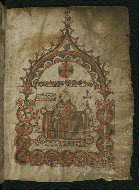
- Title: Virgin and Child
- Form: Full-page miniature
- Text: Prefatory material
- Comment:
To the left of the Virgin is the inscription, "Thou art highly favored, the Lord is with thee" (Luke 1:28)
fol. 2v:
fol. 3r:
fol. 72v:
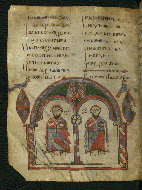
- Title: Portraits of Matthew and Mark
- Form: Half-page miniature
- Text: End of Matthew's Gospel
- Comment:
The names of the evangelists are written to the right and left of Matthew and Mark, respectively
fol. 114v:
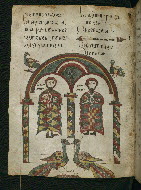
- Title: Portraits of Mark and Luke
- Form: Half-page miniature
- Text: End of Mark's Gospel
- Comment:
Names are inscribed to the right of each evangelist
fol. 192r:
The binding is not original.
Modern dark brown goatskin on wood, blind-tooled with lines and dots forming a cross of guilloche work within a trilobe outline on the upper cover, and, on the lower cover, a design of interlacing circles; three thong-clasps are missing
Created in 966 (Armenian era given 415, fol. 2v)
1575 (Armenian era given 1024), Erevan, note by Tēr Nersēs (recto of last fly leaf); this sixteenth-century colophon was copied by Amirxan Yovhannēs Amirean
Yovhannēs Amirxanean, November 20, 1839 (verso of last fly leaf)
Hovannes Amirkan, 1843 (recto of first fly leaf)
Note by Yovhannēs Amirxaneanc‘, February 10, 1844; Tabriz (T‘rviz), April 26, 1844,note by Yovhannēs Amirxaneanc‘ (recto of first fly leaf)
February 2, 1844 (This Gospels is in commemoration of the monastery of Saint Grigor the Illuminator, for the Lebanese monks who are in Rome, in the year of the Lord 1844 and on the 2nd February...). In memory of the "Illustrious, Noble and Revered orthodox noble Ała Amirxanē Yovhannēs Amireanc‘ of New Julfa, for the sake of his soul and for the sake of his whole pious and God-loving family." "Through the mediation of Father Vrt‘anēs Eiwłiwnčeanc‘. A.K. the Apostolic Misionary in Pars and in New Julfa." (recto of last fly leaf)
Antonian monastery at Ortakoy, near Istanbul, by 1910
Acquired by Henry Walters, Baltimore, before 1931
Walters Art Museum, 1931, by Henry Walters' bequest
Thanks are expressed to Professor Bernard Coulie (Université catholique de Louvain, Louvain-la-Neuve) for kindly making available his bibliography on the Armenian manuscripts kept in the Walters Art Museum.
Tašean, Y. Aknark mĕ hay hnagrowt'ean vray. Usumnasirut'yun Hayoc' grč'ut'ean aruestin (An Overview of Armenian Paleography: A Study of the Art of Writing of the Armenians). Vienna, 1898, pp. 20, 182-184 (in Armenian).
Macler, Frédéric. Rapport sur une mission scientifique en Arménie russe et en Arménie turque (juillet-octobre 1909). Paris, 1911, pp. 115-124, figs. 22-26.
Łafadaryan, K. Haykakan gri skzbnakan tesaknerĕ, hnagrakan-banasirakan usumnasirut'yun (The Original Types of Armenian Letters, Paleographic-Philological Study). Erevan, 1939 [repr. 1953], p. 24.
Buchthal, Hugo, and Otto Kurz, A Handlist of Illuminated Oriental Christian Manuscripts. London: Warburg Institute, 1942, p. 71, no. 350.
Yovsep'ean, Garegin A., Kat'ołikos. Yišatakarank' jeŕagrac' (E. daric' minč'ew ŽĔ dar). Hator A. (E. daric' minč'ew 1250 t'.) (Colophon of Manuscripts [From the Fifth to the Eighteenth Century]. Volume 1 [From the Fifth Century to 1250]. Ant'ilias: Tparan Kat'ołkosut'ean Hayoc' Kilikioy, 1951, cols. 121-122, no. 52
Der Nersessian, Sirarpie. Armenian Manuscripts in the Walters Art Gallery. Baltimore: Trustees of the Walters Art Gallery, 1973, pp. 1-5, 85, pl. B, pls. 1-11.
Sanjian, Avedis K. A Catalogue of Medieval Armenian Manuscripts in the United States. Berkeley: University of California Press, 1976, pp. 260-267.
Kouymjian, Dickran. Index of Armenian Art, fasc. 1: Illustrated Armenian Manuscripts to the Year 1000 A.D. Fresno: California State University, 1977, pp. 6-7.
Der Nersessian, Sirarpie. Armenian Art. London: Thames & Hudson 1978, p. 117 and fig. 84.
Kouymjian, Dickran. "The Classical Tradition in Armenian Art." Revue des Etudes Arméniennes, n.s. 15 (1981), p. 277, pl. VI.
Cabelli, Diane E., and Thomas F. Mathews, "Pigments in Armenian Manuscripts of the Tenth and Eleventh Centuries." Revue des Etudes Arméniennes n.s. 18 (1984), pp. 33-47.
Mat'evosyan, Artašes S. Hayeren jeŕagreri hišatakaranner E-ŽB dd. (Colophons of Armenian Manuscripts from the Fifth to the Twelfth Century). Erevan: HSSH GA hratarakč'ut'yun, 1988, pp. 58-59, no. 72.
Alexanian, Joseph M. "The Text of the Oldest Armenian Gospel Manuscript in America: A Reappraisal of Walters Art Gallery MS 537." Journal for the Society for Armenian Studies 5 (1990-1991): pp. 55-64.
Mathews, Thomas F. "Catalogue of Manuscripts. No. 6." In Thomas F. Mathews and Roger S. Wieck, eds., Treasures in Heaven: Armenian Illuminated Manuscripts. New York and Princeton: The Pierpont Morgan Library and Princeton University Press, 1994, pp. 148-149, with pls. 4 and 5.
Merian, Sylvie, Thomas F. Mathews, and Mary Virginia Orna, O.S.O., "Appendix. Pigment Analysis of Armenian, Byzantine, Iranian, Indian, and Persian Manuscripts." In Thomas F. Mathews and Roger S. Wieck, eds. Treasures in Heaven: Armenian Illuminated Manuscripts. New York and Princeton: The Pierpont Morgan Library and Princeton University Press 1994, pp. 136, 138 (Ms. A2 in tables 1 and 2)
Mathews, Thomas F. "The Classic Phase of Bagratid and Artsruni Illumination: The Tenth and Eleventh Centuries." In Thomas F. Mathews and Roger S. Wieck, eds., Treasures in Heaven: Armenian Illuminated Manuscripts. New York and Princeton: The Pierpont Morgan Library and Princeton University Press, 1994, pp. 57-59.
Nersessian, Vrej. Treasures from the Ark: 1700 Years of Armenian Christian Art. London: British Library 2001, p. 224, no. 157.
Stone, M.E., Dickran Koumjian, and Henning Lehmann. Album of Armenian Paleography. Aarhus: Aaarhus University Press, 2002, pp. 128-129, no 6.
Agémian, Sylvia. Archives Sirarpie der Nersessian. Catalogue. Volume 1. Antélias: Catholicossat arménien de Cilicie 2003, pp. 58-59.
Ghazarosian, Arpenik. "L'art du manuscrit." In Claude Mutafian, ed. Arménie: La magie de l'écrit. Marseille: Maison Arménienne de la Jeunesse et de la culture de Marseille, 2007, pp. 84-85, no 3.12.
Rapti, Ioanna. "La peinture dans les livres (IXe-XIIIe siècle)." In Jannic Durand, Ioanna Rapti, and Dorota Giovannoni, eds., Armenia Sacra. Mémoire chrétienne des Arméniens (IVe-XVIIIe siècle). Paris: Musée du Louvre, 2007, pp. 177-178 and fig 3.
Principal catalogers: Der Nersessian, Sirarpie; Landau, Amy; van Lint, Theo M
Catalogers: Dennis, Nathan S; Valle, Chiara
Editor: Herbert, Lynley
Copy editor: Dibble, Charles
Conservators: Owen, Linda; Quandt, Abigail
Contributors: Bockrath, Diane; Emery, Doug; Herbert, Lynley; Noel, William; Tabritha, Ariel; Toth, Michael B.; Valle, Chiara
The Walters Art Museum
Licensed for use under Creative Commons Attribution-NonCommercial-ShareAlike 3.0 Unported Access Rights, http://creativecommons.org/licenses/by-nc-sa/3.0/legalcode. It is requested that copies of any published articles based on the information in this data set be sent to the curator of manuscripts, The Walters Art Museum, 600 North Charles Street, Baltimore MD 21201.
